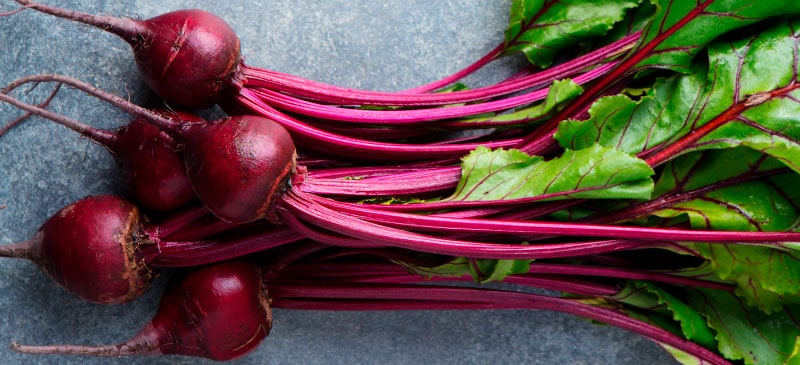Beets, often known for their vibrant color and earthy flavor, are a nutrient-dense root vegetable that offers a range of health benefits. This article explores the knowledge surrounding beets, focusing on how they support circulation and aid in detoxification. By understanding the properties of beets, you can appreciate their role in promoting overall health and well-being.
Nutritional Profile of Beets

Beets are low in calories yet rich in essential nutrients. Here’s a breakdown of the nutritional content in one medium-sized beet (about 82 grams):
- Calories: 35
- Carbohydrates: 8 grams
- Fiber: 2 grams
- Protein: 1.5 grams
- Fat: 0.2 grams
- Vitamin C: 6% of the Daily Value (DV)
- Folate: 20% of the DV
- Potassium: 9% of the DV
- Manganese: 14% of the DV
These nutrients contribute to the numerous health benefits associated with beets.
Beets and Circulation
1. Rich in Nitrates
One of the key components of beets is their high nitrate content. Nitrates are converted into nitric oxide in the body, which plays a crucial role in improving blood flow and circulation.
- Vasodilation: Nitric oxide helps relax and widen blood vessels, improving circulation and lowering blood pressure. This can enhance overall cardiovascular health.
2. Improved Exercise Performance
The nitrates in beets can also enhance athletic performance. Research has shown that consuming beet juice or whole beets can improve stamina and endurance.
- Oxygen Efficiency: By increasing nitric oxide levels, beets may help the body use oxygen more efficiently during exercise, leading to improved performance.
3. Heart Health
Regular consumption of beets can contribute to heart health by reducing blood pressure and improving overall cardiovascular function.
- Cholesterol Management: Beets may help lower levels of LDL cholesterol (the “bad” cholesterol) while promoting higher levels of HDL cholesterol (the “good” cholesterol), further supporting heart health.
Beets and Detoxification
1. Support for Liver Function
Beets are known to support liver health and detoxification processes. They contain compounds like betaine, which help the liver process fats and eliminate toxins.
- Liver Cleansing: The antioxidants in beets, including betalains, can help protect the liver from oxidative stress and promote its detoxification capabilities.
2. Fiber Content
The fiber in beets aids in digestion and promotes regular bowel movements, which is essential for effective detoxification.
- Gut Health: A healthy gut is crucial for removing waste products and toxins from the body. The fiber in beets supports a healthy digestive system, enhancing overall detoxification.
3. Antioxidant Properties
Beets are rich in antioxidants, which help combat oxidative stress and inflammation. This can further support the body’s detoxification processes.
- Reducing Inflammation: By reducing inflammation, beets can help the body function optimally, making it easier to eliminate toxins and waste.
How to Incorporate Beets into Your Diet
1. Roasted or Boiled
Roasting or boiling beets enhances their natural sweetness. They can be added to salads, grain bowls, or served as a side dish.
2. Juicing
Beet juice is a popular way to consume beets, especially for those looking to boost their nitrate intake. Combine beet juice with other vegetables or fruits for a nutritious drink.
3. Smoothies
Adding cooked or raw beets to smoothies can provide a vibrant color and a nutritional boost. Pair them with fruits like bananas or berries for a delicious blend.
4. Pickled Beets
Pickled beets make a tasty addition to salads and sandwiches, providing a tangy flavor along with their health benefits.
5. Beet Greens
Don’t overlook beet greens! The leafy tops are rich in nutrients and can be sautéed or added to salads for extra health benefits.
Potential Risks and Considerations
While beets offer numerous health benefits, it’s important to keep the following in mind:
1. Oxalates
Beets contain oxalates, which can contribute to kidney stone formation in susceptible individuals. Those with a history of kidney stones should consume beets in moderation.
2. Blood Sugar Levels
Beets have a moderate glycemic index, so individuals with diabetes should monitor their blood sugar levels when consuming beets.
3. Allergies
Some individuals may experience allergic reactions to beets. It’s essential to be aware of any adverse reactions when trying beets for the first time.
Conclusion
Beets are a powerhouse of nutrients that support circulation and detoxification, making them a valuable addition to a healthy diet. Their high nitrate content improves blood flow and exercise performance, while their antioxidant properties aid in liver function and detoxification processes. By incorporating beets into your meals, you can harness their health benefits and enjoy their unique flavor. Embrace the knowledge surrounding beets and discover how this vibrant root vegetable can enhance your overall health and well-being!
Read Also About Leafy greens, such as spinach, kale, collard greens, and Swiss chard, are among the most nutrient-dense foods you can add to your diet. These vegetables are low in calories but high in essential vitamins, minerals, and antioxidants, making them a fantastic choice for promoting overall health.



